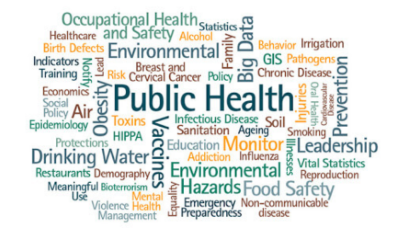Context-
Within the intricate fabric of India's diverse landscapes, a silent but profound battle unfolds against the backdrop of public health. Amidst the bustling cities and serene villages, the triumphs over diseases like smallpox, polio, neonatal tetanus, and measles remain largely unsung. These victories, achieved through enhanced sanitation and widespread vaccination, underscore the importance of preventive measures in safeguarding public health. However, in the realm of democratic governance, the pursuit of tangible achievements often overshadows these crucial efforts.
The Challenge of Populist Health Policies
Political leaders, spanning the ideological spectrum, frequently gravitate towards initiatives promising immediate results. Initiatives such as the establishment of new hospitals, subsidized treatments, and emergency response measures tend to garner attention and resources. However, the focus on short-term gains often detracts from critical areas like sanitation, disease surveillance, and public health education, which are fundamental in maintaining population health and averting disease outbreaks.
One poignant example is the approach towards addressing dengue outbreaks. While immediate relief efforts are commendable, they often eclipse long-term strategies such as understanding vector bionomics and developing effective vaccines. The emphasis on emergency response sidelines crucial research in vector control, vaccine development, and improvements in public health infrastructure. Consequently, the healthcare system remains strained, and future outbreaks remain inadequately addressed.
The Need for Research and Long-Term Planning
Research and development in public health are indispensable. The existing dengue vaccine, despite its limitations, underscores the imperative for further investigation. Moreover, the looming specter of climate change necessitates adaptive strategies to counteract shifting mosquito breeding patterns and movement. To truly combat diseases like dengue, a multifaceted approach encompassing scientific inquiry and long-term planning is indispensable.
Drawing parallels from other spheres of governance, the separation of healthcare from political processes emerges as a compelling proposition. Just as India's judicial system and space program operate autonomously, public health decisions should be grounded in scientific evidence rather than political expediency. This autonomy ensures that policies are driven by data and expertise rather than electoral cycles, fostering a more resilient and responsive healthcare framework.
Investments in Preventive Health Measures
Joseph Bhore's seminal insights from 1946 reverberate through the annals of public health discourse. Neglecting preventive health measures exacts a profound economic and human toll, underscoring the importance of sustained investments in nutrition programs and preventive healthcare initiatives. However, despite ambitious schemes like the Prime Minister’s Overarching Scheme for Holistic Nourishment (POSHAN) Abhiyan, significant gaps persist between policy targets and on-the-ground realities.
The Prime Minister’s Overarching Scheme For Holistic Nourishment (POSHAN) Abhiyan aims to annually reduce stunting by 2%, undernutrition by 2%, anemia by 3%, and low birth weight by 2%. However, according to the fifth National Family Health Survey, conducted between 2019-21, 35.5% of children under five were stunted, and 32.1% were underweight. Additionally, the prevalence of anemia among children aged 6-59 months surged from 58.6% to 67.1%, while among women aged 15-19 years, it rose from 54.1% to 59.1%. This significant disparity between policy targets and actual prevalence underscores a substantial gap in public health efforts.
The pharmaceutical industry's influence on public health is undeniable. While pivotal in advancing curative medicine, its profit-oriented nature often sidelines broader public health initiatives. For example, despite access to the same tuberculosis (TB) medications, India reported 21.4 lakh TB cases in 2021, marking an 18% increase from 2020, translating to an incidence rate of 210 cases per 1,00,000 population. In stark contrast, the United States documented only 8,331 TB cases in 2022, approximately 2.5 cases per 1,00,000 persons. This discrepancy extends beyond medication availability and is intricately linked to socio-economic factors like poverty, inadequate sanitation, and overcrowded living conditions prevalent in India due to poorly organized urban housing.
Despite concerted efforts, socio-economic factors such as poverty, sanitation, and overcrowding continue to undermine healthcare outcomes, highlighting the need for a more holistic and nuanced approach to public health management.
Challenges in Behavioral Change and Education
Behavioral change lies at the heart of effective public health management. However, in political environments marked by populist tendencies, fostering such change presents formidable challenges. The absence of specialized courses in public health engineering within India's educational institutions underscores the need for a more interdisciplinary approach to public health education and governance.
Public health transcends the confines of medical intervention, necessitating expertise from diverse fields such as environmental science, sociology, urban planning, and economics. Yet, India's public health system often remains entrenched in a physician-centric paradigm, failing to fully embrace this comprehensive ethos. To address this deficiency, a more inclusive and multidisciplinary approach to public health education and governance is imperative.
The Imperative of Autonomy
Effective public health management demands a holistic approach encompassing preventive measures, policy formulation, and community engagement. In this context, the adoption of a separation of powers framework assumes paramount importance. By insulating healthcare decision-making from political influence, policymakers can prioritize evidence-based interventions and long-term objectives, fostering a more equitable and sustainable healthcare ecosystem.
However, while autonomy is crucial, it must be tempered by a pragmatic acknowledgment of the immediate health concerns confronting the populace. Placing Health Ministries under the purview of elected officials, akin to the management of space and atomic energy departments, strikes a delicate balance between expert-driven decision-making and public aspirations. This structural realignment ensures that health policies remain attuned to the evolving needs of the population while safeguarding against the pitfalls of short-term political expediency.
Conclusion
Democracy, while not inherently detrimental to public health, often grapples with inherent shortcomings in healthcare management. From infectious diseases to non-communicable ailments, the myriad challenges confronting India's public health landscape demand a more holistic and long-term approach. By divorcing healthcare decision-making from short-term political imperatives, policymakers can chart a course toward a more resilient and responsive healthcare framework. Through a steadfast commitment to evidence-based interventions and inclusive governance, India can surmount the formidable challenges facing its public health ecosystem, ensuring the health and well-being of its citizenry for generations to come.
|
Probable Questions for UPSC Mains Exam-
|
Source - The Hindu








